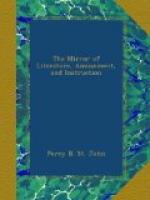false report of the fair one’s death having been communicated to
Ferhad in a sudden manner, he immediately destroyed himself; and
the scene of this catastrophe is still shown among the recesses
of Mount Bisetoon.
* * * * *
ANECDOTE GALLERY.
THE LATE PRINCESS CHARLOTTE.
(From the Life and Correspondence of Sir Thomas Lawrence.)
“In 1817, Sir Thomas Lawrence was commissioned to paint the portrait of the princess a second time, and he staid at Claremont during nine days. He one morning filled up a few vacant hours in writing to his friend, and his description of the habits of the newly-married and juvenile offsprings and heirs of royalty, forms a calm, unostentatious, and delightful picture of domestic life. How ill such pleasures would have been exchanged for the public splendour and costly amusements by which they were tempted. It is a source of infinite gratification to lay before the country such a testimony to the disposition and virtues of one, in whom centered so much of the public hope and love.”
“Extracts from Letters of Sir Thomas Lawrence.”
“I am now returned from Claremont, my visit to which was agreeable to me in every respect; both in what regarded myself, my reception, and the complete success of my professional labours, and in the satisfaction of seeing the perfect harmony in which this young couple now live, and of observing the good qualities which promise to make it lasting.”
“The princess is, as you know, wanting in elegance of deportment, but has nothing of the hoyden or of that boisterous hilarity which has been ascribed to her: her manner is exceedingly frank and simple, but not rudely abrupt nor coarse; and I have, in this little residence of nine days, witnessed undeniable evidence of an honest, just, English nature, that reminded me, from its immediate decision between the right and wrong of a subject, and the downrightness of the feeling that governed it, of the good king, her grandfather. If she does nothing gracefully, she does everything kindly.”
“She already possesses a great deal of that knowledge of the past history of this country, that ought to form a part of her peculiar education.”
“It is exceedingly gratifying to see that she both loves and respects Prince Leopold, whose conduct, indeed, and character, seem justly to deserve those feelings. From the report of the gentlemen of his household, he is considerate, benevolent, and just, and of very amiable manners. My own observation leads me to think, that, in his behaviour to her, he is affectionate and attentive, rational and discreet; and, in the exercise of that judgment which is sometimes brought in opposition to some little thoughtlessness, he is so cheerful and slily humorous, that it is evident (at least it appears to me so) that she is already more in dread of his opinion than of his displeasure.”




